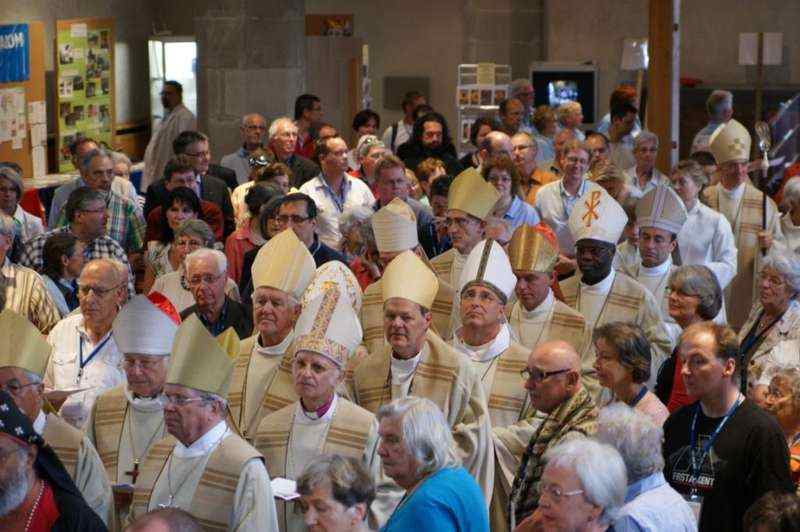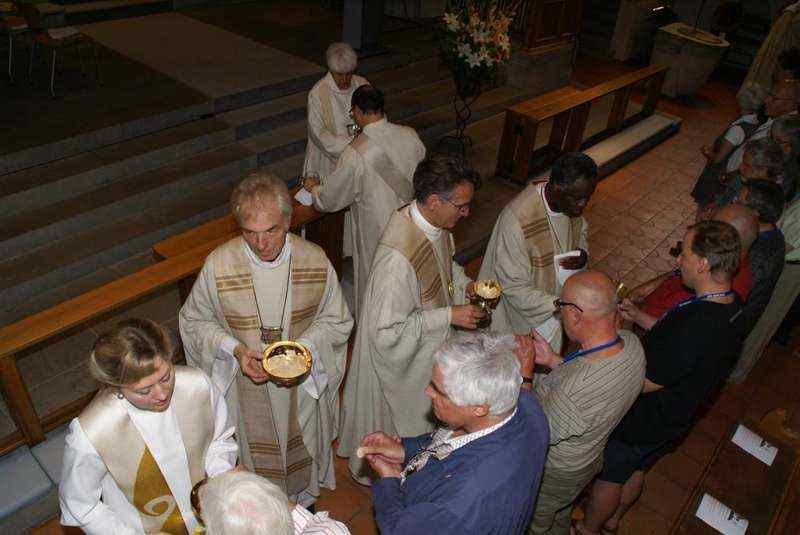Polska wersja tego artykułu znajduje się tutaj .
Archbishop Vercammen and Archbishop Williams
121 years ago, on September 24th 1889, the Old Catholic bishops of the Netherlands, Switzerland and Germany signed a common declaration. This event is considered to be the beginning of the Union of Utrecht of the Old Catholic Churches, federation of several independent national Churches united on the basis of the faith of the undivided Church of the first ten centuries. They are Catholic in faith, order and worship but reject the Papal claims of infallibility and supremacy. Thanks to the Bonn Agreement, they are in full communion with the Churches of the Anglican Communion. They have participated in the World Council of Churches since its beginning and are in formal dialogue with the Orthodox Churches, the Roman Catholic Church, the Church of Sweden and the Mar Thoma Church. The Archbishop of Utrecht a holds primacy of honor among the Old Catholic Churches not dissimilar to that accorded in the Anglican Communion to the Archbishop of Canterbury. Since the year 2000 this ministry belongs to Archbishop Joris Vercammen .
The following churches are members of the Union of Utrecht: the Old Catholic Church of the Netherlands, the Catholic Diocease of the Old Catholics in Germany, Christian Catholic Church of Switzerland, the Old Catholic Church of Austria, the Old Catholic Church of the Czech Republic, the Polish-Catholic Church and apart from them there are also not independent communities in Croatia, France, Sweden, Denmark and Italy. Besides the Anglican churches, also the Philippine Independent Church is in full communion with the Old Catholics. The Old Catholic Church of the Mariavites had belonged to the Union from 1909-1924. Currently the Mariavites are again involved in the dialog with the Union, and the Mariavite bishops take part in the International Bishops Conference. Below you can find the Declaration of Utrecht.
1. We adhere faithfully to the Rule of Faith laid down by St. Vincent of Lerins in these terms: “Id teneamus, ubique quod semper, quod ab omnibus creditum est; hoc est etenim vere proprieque catholicum.” For this reason we persevere in professing the faith of the primitive Church, as formulated in the ecumenical symbols and specified precisely by the unanimously accepted decisions of the Ecumenical Councils held in the undivided Church of the first thousand years.

Old Catholic Bishops in Procession
2. We therefore reject the decrees of the so-called Council of the Vatican, which were promulgated on July 18th, 1870 concerning the infallibility and the universal Episcopate of the Bishop of Rome, decrees which contradict the faith of the ancient canonical constitution by attributing to the Pope the plenitude of ecclesiastical powers over all Dioceses and over all the faithful. By denial of his primatial jurisdiction, we do not wish to deny the historic primacy which several Ecumenical Councils and the Fathers of the ancient Church have attributed to the Bishop of Rome by recognizing him as the Primus inter pares.
3. We also reject the dogma of the Immaculate Conception promulgated by Pius IX in 1854 in defiance of the Holy Scriptures and in contradiction to the tradition of the first centuries.
4. As for other Encyclicals published by the Bishops of Rome in recent times; for example, the Bulls Unigenitus and Auctorem fidei, and the Syllabus of 1864, we reject them on all such points as are in contradiction of the doctrine of the primitive Church, and we do not recognize them as binding on the conscience of the faithful. We also renew the ancient protest of the Catholic Church of Holland against the errors of the Roman Curia, and against its attacks upon the rights of national Churches.
5. We refuse to accept the decrees of the Council of Trent in matters of discipline, and as for the dogmatic decisions of that Council, accept them only so far as they are in harmony with the teaching of the primitive Church.
6. Considering that the Holy Eucharist has always been the true central point of Catholic worship, we consider it our duty to declare that we maintain with perfect fidelity the ancient Catholic doctrine concerning the Sacrament of the Altar, by believing that we receive the Body and Blood of our Saviour Jesus Christ under the species of bread and wine. The Eucharistic celebration in the church is neither a continual repetition nor a renewal of the expiatory sacrifice which Jesus offered once for all upon the Cross, and it is the act by which we represent upon earth and appropriate to ourselves the one offering which Jesus Christ makes in Heaven, according to the Epistle to the Hebrews ix:11,12 for the salvation of redeemed humanity, by appearing for us in the presence of God (Heb ix:24). The character of the Holy Eucharist being thus understood, it is, at the same time, a sacrificial feast, by means of which the faithful, in receiving the Body and Blood of our Saviour, enter into communion with one another (1 Cor x:17).

Old Catholic Bishops During the Eucharist
7. We hope that Catholic theologians, in maintaining the faith of the undivided Church, will succeed in establishing an agreement upon all such questions as caused controversy ever since the Churches became divided. We exhort the priests under our jurisdiction to teach, both by preaching and by instruction of the young, especially the essential Christian truths professed by all Christian confessions, to avoid, in discussing controversial doctrines, any violation of truth or charity, and in word and deed to set an example to the members of our churches in accordance with the spirit of Jesus Christ our Savior.
8. By maintaining and professing faithfully the doctrine of Jesus Christ, by refusing to admit those errors which by the fault of men have crept into the Catholic Church, by laying aside the abuses in ecclesiastical matters, together with the worldly tendencies of hierarchy, we believe that we shall be able to combat efficaciously the great evils of our day, which are unbelief and indifference in matters of religion.
1. We adhere faithfully to the Rule of Faith laid down by St. Vincent of Lerins in these terms: “Id teneamus, ubique quod semper, quod ab omnibus creditum est; hoc est etenim vere proprieque catholicum.” For this reason we persevere in professing the faith of the primitive Church, as formulated in the ecumenical symbols and specified precisely by the unanimously accepted decisions of the Ecumenical Councils held in the undivided Church of the first thousand years.
2. We therefore reject the decrees of the so-called Council of the Vatican, which were promulgated on July 18th, 1870 concerning the infallibility and the universal Episcopate of the Bishop of Rome, decrees which contradict the faith of the ancient canonical constitution by attributing to the Pope the plenitude of ecclesiastical powers over all Dioceses and over all the faithful. By denial of his primatial jurisdiction, we do not wish to deny the historic primacy which several Ecumenical Councils and the Fathers of the ancient Church have attributed to the Bishop of Rome by recognizing him as the Primus inter pares.
3. We also reject the dogma of the Immaculate Conception promulgated by Pius IX in 1854 in defiance of the Holy Scriptures and in contradiction to the tradition of the first centuries.
4. As for other Encyclicals published by the Bishops of Rome in recent times; for example, the Bulls Unigenitus and Auctorem fidei, and the Syllabus of 1864, we reject them on all such points as are in contradiction of the doctrine of the primitive Church, and we do not recognize them as binding on the conscience of the faithful. We also renew the ancient protest of the Catholic Church of Holland against the errors of the Roman Curia, and against its attacks upon the rights of national Churches.
5. We refuse to accept the decrees of the Council of Trent in matters of discipline, and as for the dogmatic decisions of that Council, accept them only so far as they are in harmony with the teaching of the primitive Church.
6. Considering that the Holy Eucharist has always been the true central point of Catholic worship, we consider it our duty to declare that we maintain with perfect fidelity the ancient Catholic doctrine concerning the Sacrament of the Altar, by believing that we receive the Body and Blood of our Saviour Jesus Christ under the species of bread and wine. The Eucharistic celebration in the church is neither a continual repetition nor a renewal of the expiatory sacrifice which Jesus offered once for all upon the Cross, and it is the act by which we represent upon earth and appropriate to ourselves the one offering which Jesus Christ makes in Heaven, according to the Epistle to the Hebrews ix:11,12 for the salvation of redeemed humanity, by appearing for us in the presence of God (Heb ix:24). The character of the Holy Eucharist being thus understood, it is, at the same time, a sacrificial feast, by means of which the faithful, in receiving the Body and Blood of our Saviour, enter into communion with one another (1 Cor x:17).
7. We hope that Catholic theologians, in maintaining the faith of the undivided Church, will succeed in establishing an agreement upon all such questions as caused controversy ever since the Churches became divided. We exhort the priests under our jurisdiction to teach, both by preaching and by instruction of the young, especially the essential Christian truths professed by all Christian confessions, to avoid, in discussing controversial doctrines, any violation of truth or charity, and in word and deed to set an example to the members of our churches in accordance with the spirit of Jesus Christ our Savior.
8. By maintaining and professing faithfully the doctrine of Jesus Christ, by refusing to admit those errors which by the fault of men have crept into the Catholic Church, by laying aside the abuses in ecclesiastical matters, together with the worldly tendencies of hierarchy, we believe that we shall be able to combat efficaciously the great evils of our day, which are unbelief and indifference in matters of religion.




